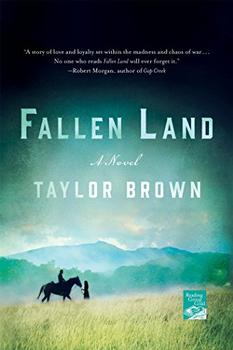Summary | Excerpt | Reading Guide | Reviews | Beyond the Book | Readalikes | Genres & Themes | Author Bio

The boy laid his cheek low against the horse's neck as they crashed through underbrush and low-hanging limbs. He hit upon an old wagon road whose dust shone white and crooked down the mountain switchbacks. The company shunned such roads, where spies could estimate the size of their force, where they could be detected at all. They took horse trails or even game trails instead, or they cut their own where the brush grew thick. The boy had the strongest horse underneath him and he was the lightest rider to boot and he believed he might outrun on the open road whomever they sent to catch him.
He dropped down, down out of the mountains in darkness, his breath and the breath of the horse pluming together, their dust hounding them as they rode. He thought of the men pursuing them, riders with plumes of dead birds in their hats, guns of many hands come to rest finally in their black-creased palms. He knew they fashioned themselves the most devoted Yankee-killers in all the land, and there were but two things that sated them: blood and money. He didn't have any money.
First light rose colorless over hills crumpled and creased into one another, a sheet enameled over a miscellany of untold items, of corpses and rock and whatever else gave the earth its shape. Sparse trees bristled from the hillsides gold-leafed, a touch of red. The season was turning, and fast. He had been out of the world for what seemed an eternity, and if he could just see her, he thought she might embrace him surely as the coat she'd made him. Their courtship so short, seconds alone, but the true shape of him displayed forevermore in the event that split them. He thought this would count above all else.
At a high outcropping of rock, he tethered the horse and climbed to the flat top to surveil the terrain behind him, the terrain ahead. Dust rose from the road far behind him. Whether of riders in pursuit, he could not say. Plenty of others traveled these roads. Couriers, runaways, men of uniformed war. Militia and home guard, too. Enemies all for a boy of his position and exploits.
He let the horse drink at a rock-strewn stream and drank some himself and set off again. In daylight he left the main road and traveled parallel, rounding into and out of sight of its commerce, his path much slowed over the closed ground. When darkness fell, he returned to the road.
Day and night he rode to see her. His Ava. Dusk of the third day he rode out onto a ridge and saw farmhouses of the sort he sought, houses like hers in the valley bottoms. Swaddling them were forests richer with autumn than the forests out of which he rode, more abrupt spurts of red and yellow against the green. Whether by time or altitude, he could not say, the land of his past mainly evergreen, few colors to mark the seasons. His heart swelled upon the vista below him until he saw the black kink of river that lay in his path, no bridge in sight.
He rode down the ridges until he reached the riverbank, where the road attenuated into a long white spear under the shallows and disappeared. A wooden barge sat beached on the bank, a ferryman dozing on the afterdeck.
The boy hauled the horse to a stop alongside and kicked the hull.
"Hey there."
The ferryman opened one eye beneath the shadow of his cap. He eyed the boy and the horse he rode and the hat he wore.
"Ten bits to cross," he said. "No bartering 'less you got something to drink."
The boy looked out at the flat river, the black surface vented here and there with hidden currents. Then he looked behind him at the road. Then back again to the river, deep as the nightmares that plagued him. The shipwreck.
"Two bits," said the man again.
"Where's the nearest bridge?" the boy asked him.
"Bridge? Two bits is cheap, son. Specially for a man with a horse like that one. Course, if you got you a drop of whiskey—"
"I need a bridge, sir. No ferries."
Excerpted from Fallen Land by Taylor Brown. Copyright © 2016 by Taylor Brown. Excerpted by permission of St. Martin's Griffin. All rights reserved. No part of this excerpt may be reproduced or reprinted without permission in writing from the publisher.
Your guide toexceptional books
BookBrowse seeks out and recommends the best in contemporary fiction and nonfiction—books that not only engage and entertain but also deepen our understanding of ourselves and the world around us.